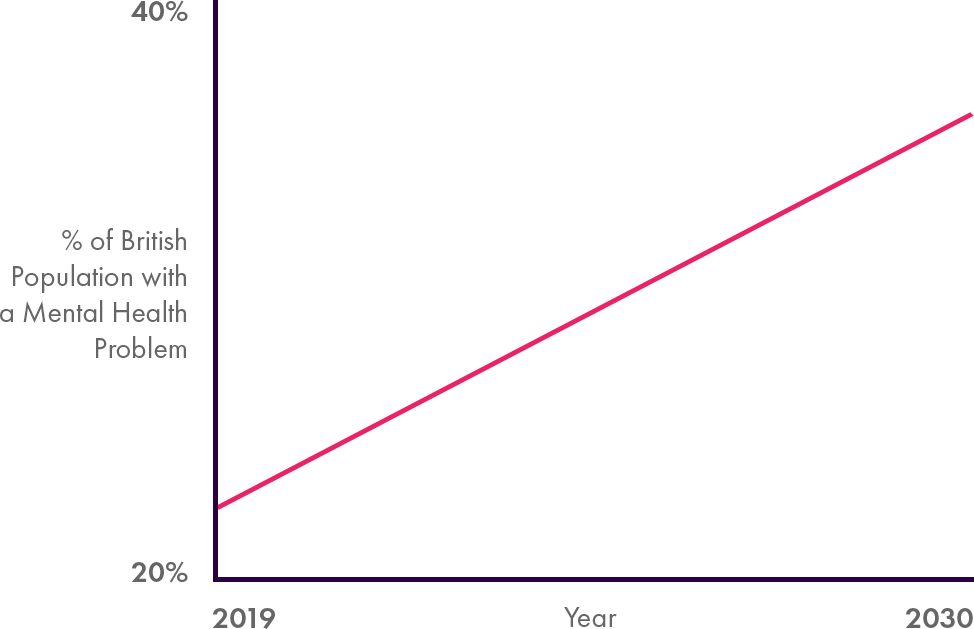What do Common Mental Health Problems Look Like?
You never know someone’s story by looking at them.





Craig's Story
Craig is a Project Manager for a large banking organisation. In 2019, Craig was diagnosed with Clinical Depression. After an extremely busy year, Craig started to feel different from his outgoing, funny and positive self.
Craig found himself losing interest in the things he loved, and his sleep started to suffer; at first too little, and then too much. Craig then booked an appointment with his GP, and broke down into tears when he was diagnosed with depression. The tears were not from fear or sadness, they were tears of elation. Tears of acceptance. Tears because he could find help.
After a hugely beneficial 8-week course ran by the NHS, he could notice the ‘triggers’ and identify ‘coping strategies’ when the ‘bad days were occurring’.
Although ‘bad days’ still occur, Craig is able to manage his mental health due to the support from his family, friends and especially colleagues.
Craig’s only regret; being reactive not proactive with regards to his mental health.
Tanya's Story
Working at an SME in the HR department, in February 2018 Tanya had given birth to a beautiful baby boy called Alfie. However, 1-month after the birth, Tanya started to feel "down, depressed and hopeless".
Although Tanya usually spoke about everything to her family and friends, this was something she felt she couldn’t talk about.
On the ‘outside’, Tanya’s life seemed perfect. She was in a secure job, with a loving husband and newborn baby. However, on the inside, Tanya was struggling.
After allowing the depression to manifest for 9-months, Tanya opened up to her husband. After explaining what she had been going through, Tanya’s husband encouraged her to see a therapist.
After seeking specialist help from a Cognitive Behavioural Therapist, Tanya has made a full recovery from her depression.
Tanya urges anyone who is currently suffering to not suffer in silence. Tanya says that opening up is the best thing she's ever done.
Richard's Story
A Director of a private equity firm in London, Richard attempted to take his own life in 2019.
Richard has over 30 years of experience in the private equity field, where he has always been able to cope with the high levels of pressure. However, in 2018, something changed. Richard's mental health was rapidly spiraling downward, until he reached crisis point.
Throughout this whole period, Richard was afraid if he spoke to any of his colleagues he would lose his job, as 'he couldn't handle it' anymore. Richard openly admits he use to share this attitude. When Richard hit rock bottom, he tried to take his own life.
Fortunately for Richard, he is still with us today, and is in a very positive place
Richard said he was completely wrong in his previous belief that mental health problems were just ‘an illness for millennials’. Richard now recognises that ‘millennials’ are just more likely to talk about their mental health, and not stay in jobs that are bad for their mental health.
Meg's Story
Growing up, Meg’s mother was a functional alcoholic and had attempted suicide twice. Growing up, Meg thought that negativity was the norm.
Fast-forwarding into Meg’s teenage years, symptoms of depression and anxiety were present, alongside bulimia (an eating disorder). At university, Meg went to see a counsellor which changed her outlook and equipped Meg with the tools to prevent falling back into depression or anxiety.
Meg has found that exercising regularly, enjoying the small things and reducing alcohol consumption has had a significantly positive impact on her mental health.
Robert's Story
Robert’s mental health had always been good up until 2015. Robert had previously thought that mental health problems were not real, and people with mental health problems were seeking attention.
However, after a period of poor sleep, doing little exercise, working evenings and eating poorly, Robert developed anxiety in everyday situations that impacted his family and work life severely.
Robert explains the symptoms he experiences as a constant sense of dread and worry about the future, even though he was in a secure job, with good friends and a happy family.
Although Robert still experiences bouts of severe anxiety, he is now equipped to cope with them.
Like Craig, he wishes he took a proactive approach to working on his mental health.
